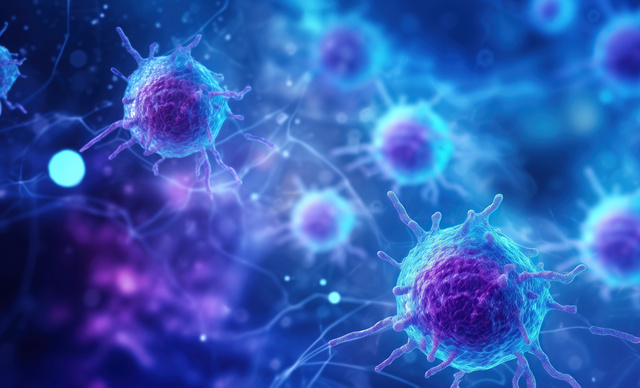Cancer vaccine: Institut Curie announces the creation of start-up Cereus Biosciences

The development of anti-cancer vaccines has been a major therapeutic innovation in recent years. The principle is to induce a specific immune response against cancer cells, by presenting the immune system with a tumor antigen capable of triggering a targeted and powerful reaction. Today's therapeutic vaccines are personalized: they target tumor mutations - known as "neoantigens" - specific to each patient. This enables the immune system to recognize the most relevant tumor targets for a single patient.
Cereus Biosciences, founded in 2023 at Institut Curie, aims to reduce the treatment delays induced by personalization and make this therapeutic innovation more widely available, using a revolutionary technology that overcomes the current limitations of cancer vaccines.
Combining immuno-oncology and bioinformatics for universal vaccines
Cereus Biosciences was born of the scientific union of its three co-founders:
- Dr Antonin Morillon, expert in multiomics[1], RNA and epigenetics, director of the "Dynamics of genetic information: fundamental bases and cancer (DIG-CANCER)" unit (UMR3244 - Institut Curie, CNRS);
- Prof. Daniel Gautheret, expert in RNA bioinformatics, team leader at the Institute for Integrative Biology of the Cell (I2BC), (Université Paris-Saclay, CNRS, CEA);
- Dr Olivier Lantz, Director of the Clinical Immunology Laboratory at Institut Curie, developer of a vaccine against uveal melanoma.
The team was then strengthened by the arrival of Pre Cindy Neuzillet, a gastroenterologist specializing in digestive cancers at Institut Curie.
Drawing on multidisciplinary expertise in computational tumor genomics, Cereus Biosciences provides collections of neoantigens shared by cancer patients, and for the main tumor types. As a result, it will soon be possible to create ready-to-use cancer vaccines accessible to the greatest number of people, without the constraints of personalization. The particularity of the start-up is to screen unexplored sources of neoantigens using an original bioinformatics approach that ensures that no tumor variation is missed, as Dr. Morillon and Prof. Gautheret say:
Our unique algorithms enable us to identify sequences coding for neoantigens shared throughout the genome, including the 'dark genome'[2]. No technology to date is capable of covering the entire genome with such precision.
By collaborating with Institut Curie's Clinical Immunology Laboratory, Cereus Biosciences is able to test and validate its candidate molecules in vivo on patient blood samples.
"This is a novel approach that has the potential to revolutionize current cancer treatments," explains Jean-Pascal Tranie, President of Cereus Biosciences. Initially a mentor to the start-up even before its creation, this renowned venture capitalist with 25 years' experience was won over by the project from the outset. "Cereus Biosciences will make it possible to create universal, low-cost vaccines in a very short time. I enthusiastically agreed to join the company as Chairman, to bring this cutting-edge innovation to market and to patients."
Proof of concept opens the door to clinical trials
Thanks to maturation funding, initial proof-of-concept studies have demonstrated the immunogenicity of shared neoantigens in uveal melanoma, a rare cancer, and confirmed their existence in multiple myeloma, acute myeloid leukemia and pancreatic cancer. The company is now focusing on pancreatic cancer, the 4th leading cause of cancer deaths in France, with a rising incidence (INCa 2023), with the support of Pre Cindy Neuzillet, who will lead future clinical trials.
These results are extremely encouraging! They point to the development of a vaccine vector and the start of the first clinical trials demonstrating the vaccine's efficacy on an initial cohort of pancreatic cancer patients, before the end of 2025.
declare Dr Morillon and Prof Gautheret.
We are delighted by the creation of this new Institut Curie start-up, which testifies to the excellence of our researchers' work and the relevance of the integrated incubator model supported by the Carnot Curie Cancer label. What's more, with a technology created, validated and soon to be in clinical phase at Institut Curie, Cereus Biosciences is a wonderful illustration of the interdisciplinarity and the care-research continuum that are the very essence of Institut Curie.
says Dr Cécile Campagne, Director of Institut Curie’s Technology Transfer Office and Deputy Director of Carnot Curie Cancer.
Cereus Biosciences aims to be at the forefront of cancer vaccine therapy over the next few years, so that this approach can benefit all patients and all indications as quickly as possible.
[1] The human genome is commonly divided into two broad categories. 2% of the genome codes for proteins, and the remaining 98% is made up of non-coding or little-known elements: this is known as the "dark genome".
[2] Biotechnology discipline combining the latest advances and analyses from the research fields of genomics, metabolomics, transcriptomics and proteomics.

